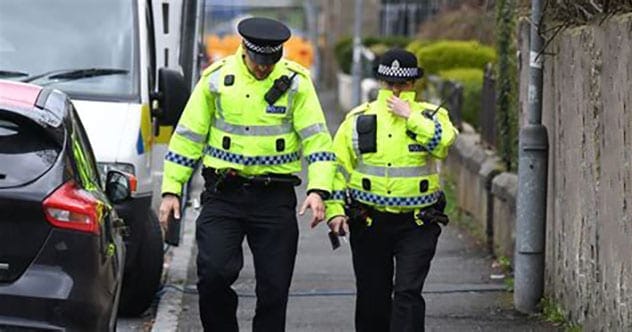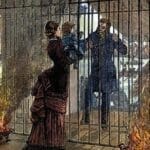History teaches us that human rights can be easily trampled during times of crisis. The coronavirus pandemic was no different. The British government armed its police force with powerful new tools to detain those accused of violating quarantine rules. Legislation like the Coronavirus Act 2020 allowed police to use “reasonable force” to enforce lockdown orders. Updates to the Health Protection Regulations meant citizens couldn’t leave home without a “reasonable excuse.” The police embraced these powers with remarkable, sometimes alarming, enthusiasm.
Many police forces started scrutinizing everyday life, taking an unprecedented interest in people’s shopping, exercise, and social habits. Citizens were penalized for spending too much time outdoors. Police vans patrolled parks and shopping areas, and the “non-essential” activities of walkers and sunbathers were shamed on police Twitter accounts.
It soon became clear that some police forces were abusing their new powers. In May, it was revealed that every charge made under the Coronavirus Act was wrongful. The media reported arrests for sitting on park benches. The Home Secretary had to remind officers to police by consent. Here are ten instances where British police went too far during the pandemic.
Clamping Down on Easter Eggs

During Britain’s coronavirus lockdown, the government ordered the closure of cafes, restaurants, markets, and other “non-essential” businesses. While convenience stores remained open, some officials began enforcing trading rules that didn’t even exist.
Gloucestershire police descended on Gloucester Retail Park, using CCTV to monitor shoppers. Officers then admonished customers for buying non-essential items. “Essential journey? Some items on our list so far… paint, top soil, a sat-nav, an Easter egg, a scratch card, bamboo fencing, stone chippings,” tweeted the Gloucester City Police. “Ask yourself if it’s really necessary. Help save lives and stay at home.”
Northamptonshire Police Chief Nick Adderley warned that non-compliant citizens could face tougher restrictions. Cambridge Police went further, dispatching officers to check the “non-essential aisles” of grocery stores. The Association of Convenience Stores (ACS) reported officials instructing stores not to sell Easter eggs and hot-cross buns. The head of the ACS, along with the Home Secretary, clarified that there were no new restrictions on what essential retailers could sell.
Issuing Fines for Chalking
A London bakery introduced safety measures to protect customers. The owners of Grodzinski Bakery in Edgware sprayed social-distancing markers on the sidewalk to keep customers at least two meters apart. However, a Metropolitan Police sergeant considered the lines to be graffiti and issued a ticket for criminal damage. The bakery manager explained the markers were temporary, spray-on chalk.
A bystander questioned the ticket, but the officer responded, “Yes, sir, because the law is the law. It doesn’t change just because of what’s happening. Otherwise there would be anarchy in the world.” The officer instructed the bakery owner to remove the markers. The Metropolitan Police eventually reversed course after the incident went viral, and the ticket was scrapped.
Following Citizens with Drones
The use of surveillance technologies is increasingly common in Britain. Police forces are now equipped with aerial drones that can collect live video feeds and thermal images. During the coronavirus outbreak, police used these drones, along with roadblocks, to enforce social distancing and prevent unnecessary journeys.
The Coronavirus Act 2020 granted police new powers to force residents to return home. The Civil Aviation Authority relaxed drone safety rules, giving officers more control over beaches, parks, and residential areas.
This legislation came into focus when Derbyshire Police launched drones to spy on walkers in the Peak District, a secluded park in rural England. The police also used the devices to record license plate numbers of cars in a nearby parking lot. The police posted footage of the walkers on Twitter, adding motion graphics and captions like, “Walking your dog in the Peak District. Not essential,” and “Heading to the Peaks to watch the sunset. Not essential.”
Flipping a Barbecue

On March 24, neighbors in a Coventry apartment complex were preparing an outdoor barbecue. Police officers arrived after catching the scent of the cooking and found about 20 people gathered. The officers instructed the group to disperse.
The group argued they had the right to continue the barbecue. “My children need to eat,” one woman pleaded. When the residents wouldn’t comply, the officers flipped the barbecue over, scattering food and charcoal across the ground. They then posted a photo of their actions on the West Midlands Police website, with the caption: “Our officers were forced to tip the BBQ over as the defiant group initially refused to leave.”
However, the police action was not mandated, as the Health Protection Regulations 2020 didn’t come into effect until several days later, meaning the officers had no power to force residents back inside. The barbecue was entirely legal.
48 Hours in Custody for ‘Loitering’

Marie Dinou was the first person convicted under the Coronavirus Act 2020. On March 28, the British Transport Police (BTP) spotted Dinou “loitering between platforms” at Newcastle Central Station. Accused of traveling without a ticket, she was detained for failing to comply with the Coronavirus Act 2020 and refusing to provide her “identity or reasons for journey.”
Dinou was held in police custody for 48 hours. She appeared at North Tyneside Magistrates’ Court, but after she refused to identify herself, the judge found her guilty of violating lockdown rules and fined her £660 ($800). The proceedings, conducted in a single hearing, took place in Dinou’s absence.
The police and judiciary faced criticism when it emerged they had orchestrated a wrongful prosecution. Kirsty Brimelow, chair of the Bar Human Rights Committee, stated she was prosecuted under the Coronavirus Act Sch 21; she committed no offense under this Act. Offenses under Schedule 21 only apply to individuals considered “potentially infected.” The act doesn’t give police the power to demand a person’s identity or reasons for travel.
Charging a Homeless Man for Breaking Lockdown

In late April, a Metropolitan Police officer confronted a homeless man, Sultan Monsour, at Liverpool Street Station in London. Monsour told the officer he lived in Stratford, but then admitted he was homeless. Seeing him again 10 days later, the officer charged him with violating the lockdown. The charge sheet stated he was“[w]ithout reasonable excuse, other than as permitted by the regulations, [you] were outside of the place where you were living, namely no fixed address or refused to provide your address details.”
On May 4, District Judge Alexander Jacobs expressed confusion during a hearing at Westminster Magistrates’ Court. “If he is homeless then the charge ‘that he left the place he was living, namely no fixed address’ doesn’t make sense to me,” the judge argued. The judge was also baffled by the arresting officer’s remarks that the accused was arrested for “breaching coronavirus conditions because he had no address.” Despite the judge’s reservations, the prosecution insisted the case proceed.
Journalist Brendan O’Neill witnessed officers marching through St. James’s Park in London, shouting covid regulations at the homeless. “The most despicable thing I saw was a policeman telling an elderly homeless gentleman to move on. Inarticulately, the man explained he had nowhere else to go,” O’Neill said. When the journalist questioned the officers’ approach, one cop retorted “I don’t make the rules.”
The War on Front Yards
In 1604, English jurist Sir Edward Coke stated “Every man’s house is his safest refuge.” But this right seemed to disappear in Britain during covid. On April 9, a police officer in Rotherham told a man that his children weren’t allowed to play in the family’s front yard. The officer instructed the father, Daniel Connell, to return home. When the 23-year-old said he planned to go shopping, the officer responded: “You’ve already been to the shop once. I’ve seen you with two cans of pop.”
No such garden ban existed in Britain. South Yorkshire Police apologized after the incident made headlines.
Rafael Todes, a renowned musician, received similar warnings. The violinist staged outdoor concerts for his street, with his wife and children playing outside their front door. The music was meant to raise community spirits and raise money for St. John’s Hospice in London. However, two Metropolitan Police officers shut the event down, stating that neighbors had gathered outside their homes, violating the lockdown.
Banning Park Benches

Many benches across Britain were taped off, with officers patrolling seating areas. The National Police Chiefs’ Council even issued guidance on when the public could rest on benches. “A short walk to a park bench, when the person remains seated for a much longer period,” was considered a potential violation.
Police in Glasgow instructed a disabled woman and her autistic son to leave Glasgow Park, where they were resting on a bench after their daily walk. The woman, Kiki Flood, who has metal plates in her body and an inner ear condition affecting her balance, was told her disability was no excuse. In a separate incident, officers told a resident with Ehlers-Danlos syndrome that she couldn’t use the bench, forcing her to endure extreme joint pain as she carried her groceries home.
On April 5, a woman sitting by the River Thames in London was arrested for “exercising her mind.” She was taken home in a police van, “de-arrested,” and given a fixed penalty notice.
Hunting a Plague Doctor
A teenager from Norwich was spotted wandering around dressed as a plague doctor. Footage of the boy, taken in Hellesdon, caught the police’s attention. Wearing a long black coat and a plague doctor mask (originally worn during the 14th century bubonic plague to ward off “bad air”), the boy strolled around his village.
The Norfolk Police cautioned the prankster, stating, “The individual has been spoken to about the consequences of his actions and the effects they may have on some people in the local community.” However, the police admitted no crime had been committed.
“I’ll Make Something Up”
One sunny April afternoon, Adam Kidger was stopped by the Lancashire Police while on his way to collect a quad bike in Accrington. The officer accused him of breaking lockdown rules and adopted an aggressive stance: “You wanna f**king step [up] to me, and puffing your chest out – something like that – then, fine, I’ll lock you up. We’ll do that, shall we?” When Kidger asked what crime he had committed, the officer responded: “I’ll make something up: public order [offence], squaring up to a police officer. Shall I do that? Who are they gonna believe, me or you?” The officer stormed off after Kidger pointed out the camera filming him.
Footage of the officer’s conduct was leaked, and the Lancashire Police disavowed his actions, reporting itself to the police conduct watchdog. The officer was suspended.
The actions of British police during the COVID-19 pandemic sparked considerable debate about the balance between public safety and individual liberties. While law enforcement agencies faced unprecedented challenges, these incidents underscore the importance of upholding civil rights and ensuring accountability, even in times of crisis.










